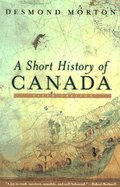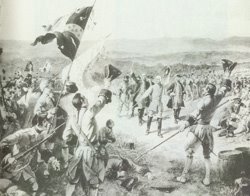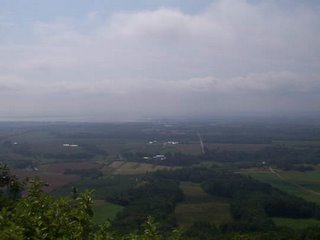
Desmond Morton writes well enough, in very sparing prose, a readable history of a country that begins far earlier than its Confederation of July 1, 1867. He is considered an eminent expert on the topic. Oh well, too bad this book contains glaring inaccuracies. It is a glazed interpretation and compacted details of the facts and should be read with such a perspective. As he has emphasized, compromises are requirements of citizens of one nation, especially in decisions related to what needs to be known about its history. But trust must often be placed in more than one historical accounting, and thankfully opposing views can often be complimentary. But evidence must be fairly weighed and sometimes challenged to be construed as an honourable accident. I am not sure if anyone has ever previously challenged his accounting on the Acadians. I could find no evidence of it online.
Even the name of this country, Canada, is a compromise choice, something characteristic of Canadian history. The country is often more well known internationally as, "that other country", represented by, "that unidentified man" in pictures of world leaders, that place which is, "the same as the USA" according to many travellers (Koreans included) who have made extensive travels, even those on one or two week-deep investigative forays and tour-guided or back-pack hostelling trips reveal to many a basically indistinguishable American cousin. Most of this book comes off with credibility.

But Canada as a country has always been the great, seemingly perpetually unresolved new country of North America. Such a path has never really been determined, though headily the national experiment continues on, thankfully without the common aspects defined by other evolving societies, be they through wide-spread civil wars or velvet separations. It only takes a real cross-country trip in Canada to define its awe inspiring contrasts, in cultural underpinnings, regional differences, and vast un-demarcated widths of veritable open space, to understand its under-lying values in racial, religious, and intercultural tolerances, probably unparalleled in any other nation. Due for change if Americanisation continues as well as declining voter turn-outs. But that is a trip that many have yet to make, as in reality it is such a huge country, it does encompass great pockets and crannies of variations in perspectives, and Canadian resilience in defining culture, even and often in vast unexplored regional libraries. So Morton's best words are his last ones.
"History is another word for experience, not a form of prophecy. The past tells Canadians that they live in a tough old country with a tradition of compromise, an aversion to violence, and a gift for survival. Only the Swiss and the Americans have older federal systems, and Canada's federation has outlived many gloomy prophets. Whatever the temptations, geography makes it hard to live apart. Under a shell of cynicism and self-deprecation, Canadians are as proud of their land as any people on earth. Make no mistake about it."
Does that mean I really have to like "The Trailer Park Boys"? I always though Lucy was a little weird, and as far as I remember, she always dressed like that. But this does not mean Canada's history is in any way...boring. Or as Morton tells it, perhaps not always fully revealed. Morton begins with a review of what is known of First Nations peoples, for this there is no written history, but it is not "time out of mind" as English law used to consider the period. The Iroquois, the Algonquin, the Mic Maw, the Haida, all have a story to tell. Tiny fragments of bone, speech and language patterns, tales of native elders, knowledge of medicinal plants, all of these indicate great intrinsic memories, some of which are preserved, and upon the first meetings with European explorers in the 1500s, as many as a million inhabitants called Canada their home already.
He explores many myths which encompass the founders stories, from an Earth Diver plunging into the muds of an ancient ocean to emerge with a "Turtle Island" which brings to mind similar stories to the Hindu Vedas or even the Birth of Kim Suro Wang. There were various shamanistic characters, "The Raven" on the West Coast, "The Coyote" in the centre of Canada, and "Glooscap the Giant" among the East Coast Mic Maw. All of these peoples, while believed to have crossed an ice or land bridge from Asia anywhere from 10,000 to 25,000 years ago, well compromise a theory about migration patterns, and as theories are known as unproven hypotheses, such an interpretation of events is perpetually up for question. To date, none have proven where the First Nations originated. All evidence appears to push back their first dates of arrival, mostly earlier and earlier.
The key dynamics among First Nations were their abilities to adapt and survive in harsh conditions all across the country over millennia. Their approach to nature was also a form of compromise. Only technological advantages have allowed some people to assume mastery over the world of peoples and its lands (or its history books). The original First Nations had the skills and resources to live in harmony with it. That all changed, with the arrival of Europeans.
Morton details somewhat succinctly that Jacques Cartier an explorer on contract with Francis I posted the French bid for North America in 1534. Basque and Breton fishermen had been coming earlier in secrecy, and Vikings had made inroads much earlier, probably in the 12th and 13th centuries. It was all about basketfuls of fish off the banks of Nova Scotia and Newfoundland, which existed in such qualities and quantities (before factory freezer trawlers and sonar fish finders) that they stopped ships from sailing through them. So it only took about five hundred years to reduce most of the world's oceans to deserts in this respect. No wonder Cousteau was so bitter in, "Cousteau, My Testament: Man, Octopus and Orchid" (1998). While everyone wanted gold, fish would do, and Samuel de Champlain arrived on the Bay of Fundy, remaining a few winters and losing many to scurvy before moving to the Saint Lawrence River and setting up a new habitation in 1608.
As Morton relates, these first men became coureurs de bois (woods travellers) and began meddling in the affairs of the Iroquois, trading steel knives and copper kettles for furs and animal skins highly prized in Europe. Wars began between Dutch trading and French trading rivals, Iroquois and Huron or Algonquin usually doing the fighting and dying. This went on for a century. Religious conversion also played a role in the fur trade and its purposes, and with the arrival of missionaries, infections and diseases also decimated the First Nations. So too, habitants (dwellers) from France arrived as colonists of the rich alluvial valleys stretching up along the rivers of French Canada.
Morton further notes, after 1700, much immigration had ceased, but populations in New France reached nearly sixty thousand. This was the advent of the Seignurial System, that of settlement agents, somewhat like feudal lords and habitant farmers, with long strips of land leading back from the river fronts to lush forested land hardily converted to farming and pasturage. 1701 saw the beginning of "The Great Peace" a pact signed between French and Indian neighbours. But during the same period, the English had established more northern fur trading posts, managed by The Hudson's Bay Company, a chartered corporation similar in hierarchy and purpose to The East India Company and founded in 1670. The French had no navy, and were in direct expansion competition with The Thirteen Colonies. New France became a distant pawn in European politics.

So as Morton tells it, the French had made provocative moves in settlement of New Orleans and Louisiana as well as attempts to fortify Pittsburgh with Fort Duqesne, George Washington and then British troops were run out of the Ohio Valley, while Louisbourg on Cape Breton Island was defeated in 1758 by superior British and American forces. In the Marquis de Montcalm, victories were had at Ticonderoga in 1758, but defeat under the attacks of General James Wolfe at the seige of Quebec in 1759 have given us the memorial of the Plains of Abraham.

But it is here that Canadian history appears to take a page from the methods by which the Ottomans succeeded, especially in the siege of Constantinople in 1453 by Mehmed the Conqueror. First of all, uncharacteristically, the British did not force assimilation of New France as might have been expected. Once the fighting died down, neither did Mehmed. There was a Royal Proclamation in 1763 which promised substantial sovereignty under the Crown, the first Britsh Governor, General James Murray, maintained a regard for the ordered, rural, and dutiful society inherited with Catholic Clergy and Seigneurs intact as, "perhaps the bravest and best race on the globe". The Quebec Act of 1774 entrenched their traditional roles. But with the American revolution, Canada became partioned under two sets of official administrations, one, Upper Canada, for a model development based on British society, and the other Lower Canada, where Canadiens could keep language, civil law, and religious institutions. It was obviously an issue of too many to assimilate, and two few to do the assimilating. Not so in Acadie.
The brutalities of British conquest were metted out upon another string of French communities, in the lower provinces, namely Prince Edward Island, Nova Scotia, New Brunswick and parts of Maine. Mostly, French settlers in this region lived between the shore and forest, with few river valleys suitable for farming. Towns and cities had developed around harbours, and the greatest wealth remained the sea. Acadians were mostly those who remained in the area of Port Royal and Acadian lands were transferred to British with the Treaty of Utrecht in 1713.

It is here that Desmond Morton appears to fail to do his homework. He claims merely sixteen hundred Acadians lived in the region at that time who refused to claim allegiance to either French or English prior to and during the French and Indian War. But the University of Maine more carefully details the facts.
"The deportation of the Acadians began in the fall of 1755 and lasted until 1778. The first removals, comprising approximately 7000 people, were from settlements around the Bay of Fundy. After the British captured Île Royale and Île Saint-Jean and raided the Gaspé and the Saint John River in 1758, further Acadians were captured and deported. Those who had sought refuge in Saint-Pierre and Miquelon were also removed. Farms and businesses were destroyed. A British officer arriving at Annapolis Royal in October 1757 observed “ruined habitations, and extensive orchards well planted with apple and pear trees, bending under their weight of fruit.”" http://www.umaine.edu/canam/ham/acadiansettlement.htm

Some Acadians escaped the deportations by running into the forests of the Annapolis Valley and hiding with the Indians. Many starved to death on the shores of the Bay of Fundy. "The Acadians had long intermarried with the Mic Maw people, and became the first people to have a North American name and a political and cultural identity distinct from Europe. There was peace and stability. Families grew, the population increased, the economy thrived, and a distinctive sense of community and culture emerged." (Anonymous)
This is the real reason I think that historians like Morton misrepresent the facts. The French of New France were considered a pure people, European, and thus civilized. The Acadians by contrast, while also of European descent, were considered of inferior quality, due to the question of their mixed race. A question that even my Grandmere Leocade avowed was untrue, and even in her youth, in the 1920s, a small band of Mic Maw lived on the far shore of the Pokemouche River across from her village. Maybe people like Morton noted similar distinctions of the time that led them to believe that only 1500 of the people seperated forever from their families, neighbours, friends, and worldly possessions were actually real Acadians. For whatever reason, it must be easy to dismiss the archives and records the British themselves kept of the entire event, documents which remain in the archives of all Canadian citizens. Acadians themselves appear to maintain a grasp on the details and the facts.
So stands a review of "A Short History of Canada". It would be a lot shorter still if writers were as careless as Morton appears to be. What others have to say obviously offers greater supplement to Canada's history. It just appears, in at least one case, it is not as short as he would make it seem. For even a short idea of the topics available: http://www.iccs-ciec.ca/blackwell.html
No comments:
Post a Comment